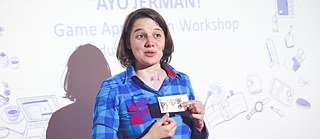In Conversation with Linda Kruse
Game Developer from Germany

Linda Kruse and Marcus Bösch founded the studio The Good Evil in Cologne in 2013. Together with Indonesian game developer Nightspade, Linda created the app JERMANIA – an interactive journey through Germany. The project was initiated by Goethe-Institut Indonesien.
As game developer, you founded The Good Evil. What exactly does your company do?
The Good Evil designs and develops digital games, from the idea to the finished product. Our goals are interactive applications through which users can experience and learn something – not learning something like in a class room at school, but learning something like jumping over a river, igniting a fire or the collective entering of a new continent.
[We shape experiences and adventures – both digital and analog. Through our games, users can learn English, they can piece together German history, they can understand how it feels like to be a stranger or how one can stay fit through the help of a pizza box.
Our clients include, among others, publisher Bastei Lübbe, the State Center for Political Education of North Rhine-Westphalia, Historisches Museum Basel (Historical Museum Basel), Deutsche Welle and broadcasting institution WDR. In addition to assignments and in-house productions, such as our adventure app Squirrel & Bär – we consult companies, organizations and cultural institution, starting from lectures and tailored workshops to full support of the whole process.]
What makes your company different from other game developers?
We develop our games and gameplay based on the content that is supposed to conveyed. Therefore, we choose the principle of the game (the game mechanics) in a way that the content can be mastered optimally by the player. It’s the only way playful learning works.
It also works to our advantage that both managers – Linda Kruse and Marcus Bösch – have previously worked in other content-driven media fields, Linda in film, Marcus as a journalist. Be it historical, scientific or other informative content – based on the combination of experiences in these particular fields and gaming knowhow, The Good Evil offers something that is unique, at least in the German-speaking region. The Good Evil has, for instance, established the term Newsgames in Germany and created the information website sciencegames.de that discusses the combination of science and games.
What kind of games have you produced already?
Our learning English game Squirrel & Bär is, for example, an adventure game set to music and sound for children between 3 and 9, for which numerous English native speakers convey vocabulary of the European Frame of References Level A1 in studio quality. And this is practically only a bonus, because the focus lies on the game, the adventure. This app is much more extensive than your usual language app for kids.
We have invested a lot of time into testing and the psychological and didactical foundation of the project. This meant that we chose the more uncomfortable and longer path. But instead of quick profits, we rather focus on creating a product that comes from the heart and can be played again and again.
In addition to our previously mentioned in-house production Squirrel& Bär, we have worked on a number of assignments, for instance a series of smaller Newsgames for a satirical news show on television. Together with Historisches Museum Basel (Historical Museum Basel), we created the Basel 1610 prototype for a historical point and click adventure that allows historical personalities to experience a scenario of the plague in a historically correct setting. In collaboration with Wissenschaftsladen Bonn and TU Dresden, we are currently working on another point and click adventure that is supposed to introduce girls to the field of renewable energies.
What do you think about the game developers scene in Germany? Is there any funding programmes from the federal states or German institutions allocated for the gaming industry?
We appreciate being a part of the German game developers scene. It is a rather small scene, a comfortable size, that almost feels like a family. It consists of veterans who have been active in the industry for many years and many smaller indie developers and indie studios who we are friends with. We regularly meet at conferences and events, share information and sometimes even work together on projects. Over the last couple of years, the number of new studios has grown, which makes us very happy.
There are different possibilities to receive support from the government, regional sponsors or other institutions, including regional location progammes, regional funding for concepts or prototypes, as well as funding for games of the various federal ministries.
The funding, however, is not as generous as in other countries, such as Canada, France or England, where it is much more progressive. The amount of money from the funding is also quite moderate. It does make a difference for small studios, but for teams with more than 3 people, it can only cover a part of the total cost – for ambitious projects, not more than a fraction.
What vision do you have for game developers in general?
In the future, I would like to see a stronger acceptance for games in society as well as learning tools in educational institutions (like in schools).
Here in Germany, games are underrepresented in the field of education, which stands in stark contrast to the high usage among children and teenagers. Games are an important part of their daily lives and enables playful experiences, that can – depending on the subject – help them to learn in a more sustainable way, much more so than using obsolete schoolbooks.